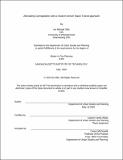Alleviating Carmageddon with a research-driven rapid transit approach
Author(s)
Ollis, Ian Michael.
Download1194632796-MIT.pdf (4.889Mb)
Other Contributors
Massachusetts Institute of Technology. Department of Urban Studies and Planning.
Advisor
James Aloisi.
Terms of use
Metadata
Show full item recordAbstract
A growing number of cities and metropolitan areas in the United States are experiencing historically high rates of congestion on roads and highways. Many of the same places have extensive, although not always well maintained or efficiently operated, transit and Commuter Rail systems. Ridership has plateaued or declined on many of these systems, highlighting their currently limited attractiveness as a modal choice. Metropolitan Boston serves as a case study into what measures would be effective in inducing a meaningful level of mode shift from automobiles to rapid transit (rail) options. In 2019 four new reports identified Metro Boston as having some of the most congested roads in the nation. Motorists nevertheless continue to drive on these highly congested roads while a developed Commuter Rail, subway and bus transit system exist across the region. This thesis uses a standardized online questionnaire distributed to motorists across Massachusetts and Rhode Island to understand individual attitudes toward mode shift, and specifically using Rapid Transit instead of driving for their regular daily commute. It targets motorists on the 10 most congested corridors in Massachusetts. 402 completed questionnaires were received from ZIP Codes across Massachusetts and Rhode Island revealing individuals' attitudes and feelings towards shifting to transit for their commute. Specific demographic considerations, other than geographical spread and origin and destination data, were not considered in this study. The findings indicate that the high level of free or subsidized parking provided across the study area draws Metro Boston commuters away from transit and that 63.7% of respondents would consider shifting to Rapid Transit if the cost of driving went up substantially (50% higher cost). Respondents further indicated that access & network limitations of the MBTA rail transit system, travel time by transit combination (including all legs of the trip), the transit system reliability, frequency of trains on a number of Commuter Rail routes and relatively high fare prices are considered factors preventing significant mode shift to transit.
Description
Thesis: M.C.P., Massachusetts Institute of Technology, Department of Urban Studies and Planning, May, 2020 Cataloged from the official PDF of thesis. Includes bibliographical references (pages 91-96).
Date issued
2020Department
Massachusetts Institute of Technology. Department of Urban Studies and PlanningPublisher
Massachusetts Institute of Technology
Keywords
Urban Studies and Planning.